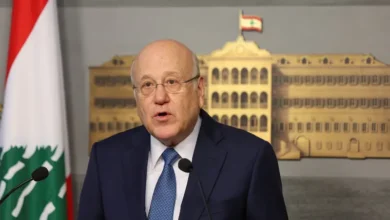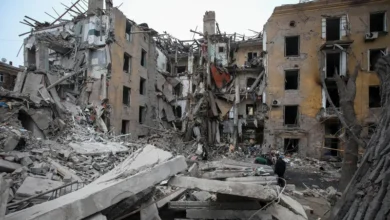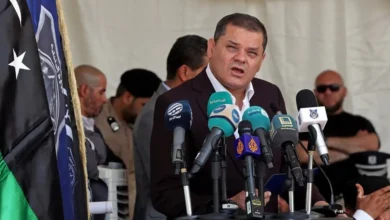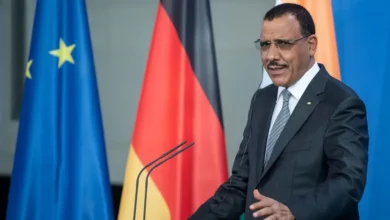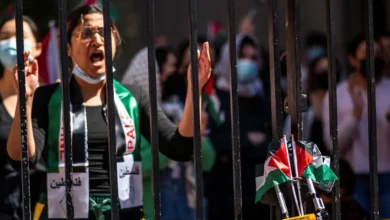‘Solidarity with Palestine’: British protesters defy threats to hit streets
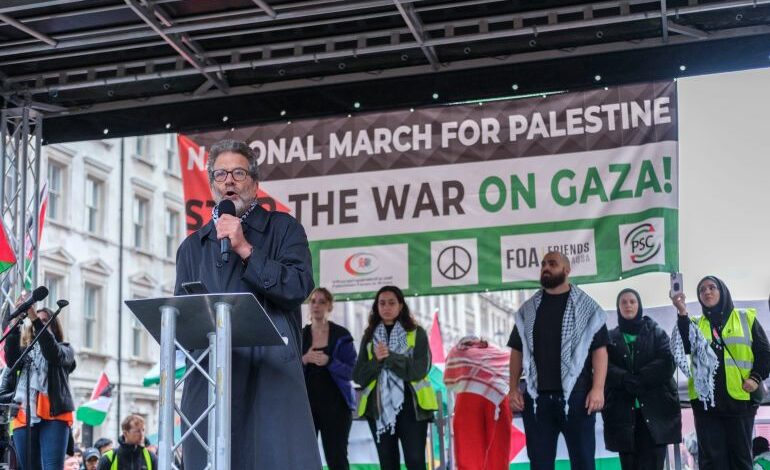
Dozens of young British trade unionists blocked access into Instro Precision Ltd – a subsidiary of Elbit Systems which manufactures Israeli military apparatus – on Thursday in protest at Israel’s continuing bombardment of the Gaza Strip.
The rally, which began in the early morning at the company’s site in Kent, southeast England, saw more than 100 teachers, academics, healthcare providers and others unfurl giant banners reading “Workers For A Free Palestine” and “UK: Stop Arming Israel”.
Demonstrations opposing the deadly campaign of Israeli air strikes – which were launched in response to the October 7 Hamas attack on southern Israel and which have killed more than 7,000 Gaza residents, including 3,000 children – have swept Britain in recent weeks.
But, from small gatherings to much larger rallies in cities including Glasgow, Manchester and London, where some 100,000 pro-Palestinian activists marched in the British capital on October 21, voices condemning Israel have had to contend with a UK government which has pledged its unwavering support for Prime Minister Benjamin Netanyahu.
‘They are supporting a genocide’
“There’s no doubt that the British government and the Western media generally are very complicit in what’s happening in Gaza,” Jeanine Hourani, who was representing the Palestinian Youth Movement on the mass picket at Instro Precision Ltd, told Al Jazeera. “They are supporting a genocide that is unfolding there.”
Indeed, the British state – which during the first world war publicly promised to establish “a national home for the Jewish people” in its controversial 1917 Balfour Declaration – has so far refused to act on overwhelming calls by UK activists to pressure Israel to cease its brutal shelling of Gaza.
Echoing the likes of US President Joe Biden and French President Emmanuel Macron, UK Prime Minister Rishi Sunak pledged to support Israel’s right to retaliate against Hamas, which killed some 1,400 Israelis during its attack earlier this month.
But on Tuesday, Amnesty International, which deems Israel an apartheid state on account of its occupation of the West Bank and its blockade of the Hamas-controlled Gaza Strip, accused Israel of “indiscriminate attacks, which caused mass [Palestinian] civilian casualties and must be investigated as war crimes”.
“It’s very difficult to determine exactly what impact [these protests] are having on the British government,” Chris Doyle, director of the London-based Council for Arab-British Understanding (CAABU), told Al Jazeera.
“What we are seeing is a slight shift in the language [of the British government] to acknowledge more the humanitarian suffering in Gaza. What we are not seeing is a call to end the siege or any criticism of the Israeli actions in Gaza where they have been targeting civilian facilities such as schools, bakeries, hospitals and water installations,” he added.
Carrie Harper, a Welsh county councillor and pro-Palestinian campaigner, maintained that British “public backlash” had forced the Conservative Party government into this tonal shift, but, like Doyle, lamented that the “overall position remained unchanged”.
“There is no balanced view being taken, there is no call for a ceasefire, and I find it incredibly saddening that [the UK government] is incapable of calling for peace,” she added. “It shows an incredible lack of leadership.”
Crucial legacy of protest
But why has the UK government – faced with hundreds of thousands of pro-Palestinian activists calling for an end to the Israeli attacks on an already impoverished enclave – taken little apparent heed of this very public show of opposition to its stance?
Seasoned pro-Palestinian activist Ben Jamal, the director of the London-based Palestine Solidarity Campaign, conceded that “large-scale protests” rarely had an immediate effect on changing government policy.
But he added: “You need to recognise that you are building a movement for change.”
Jamal was one of the 1.5 million people who marched in London in February 2003 against the looming war in Iraq. He told Al Jazeera that, despite failing to dissuade then-British Prime Minister Tony Blair from joining the US in its invasion of the Iraqi state, the rally left behind a crucial legacy of protest.
“Within what happened in the aftermath – the fact that there were no weapons of mass destruction [found in Iraq] and the chaos that ensued – there was a manifestation of a movement that had marched [in Britain] that was able to say that the lessons from this need to be taken forward,” said the British Palestinian.
Dismissed as ‘an intimidating mob’
But many British pro-Palestinian campaigners worry that their right to even protest is under threat. During the early days of the Gaza conflict, for instance, UK Home Secretary Suella Braverman wrote to the chief constables of England and Wales urging them to crack down on certain shows of support for Palestinians. And on October 16 she took to X (formerly Twitter) to voice her opposition to pro-Palestinian protesters, whom she described as “an intimidating mob”, chanting “from the river to the sea, Palestine will be free”.
“The slogan was taken up by Islamists, including Hamas, and remains a staple of anti-Semitic discourse,” she claimed.
But with more pro-Palestinian rallies planned in the coming days, including another in London on October 28, UK activists have promised to stand shoulder to shoulder with a people who have faced the full might of Israeli military hardware for the past three weeks.
“[These protests send] a fundamentally important message of solidarity to the Palestinian people,” said Jamal. “That, in the UK and elsewhere, there are huge bodies of people who do not share the views of their leadership and who are pushing for change.”
